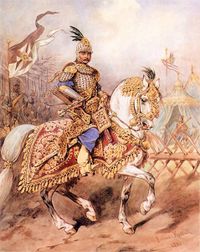Rotmistrz: Różnice pomiędzy wersjami
| Linia 1: | Linia 1: | ||
| + | [[Plik:Rotmistrz.jpg|200px|right]] | ||
| + | |||
'''Rittmeister''' - in the Polish army (from the 15th century to the mid-20th century) a Rotmistrz commanded a formation called a rota. The Lithuanian name was rotmistras. In earlier times the rotmistrz served as the commander of an infantry or cavalry company, though sometimes he would temporarily be assigned field-grade tasks commanding an entire regiment or even a larger formation. In the cavalry the rank continued until 1945 as a company-grade title. Applied to the commander of a troop, it was equivalent to a modern-day Captain, although a Rotmistrz in Poland and Lithuanian was traditionally one of the most wonted assignments as it was also a honorary title and honor to lead a company that was formed only by men of noble origin. | '''Rittmeister''' - in the Polish army (from the 15th century to the mid-20th century) a Rotmistrz commanded a formation called a rota. The Lithuanian name was rotmistras. In earlier times the rotmistrz served as the commander of an infantry or cavalry company, though sometimes he would temporarily be assigned field-grade tasks commanding an entire regiment or even a larger formation. In the cavalry the rank continued until 1945 as a company-grade title. Applied to the commander of a troop, it was equivalent to a modern-day Captain, although a Rotmistrz in Poland and Lithuanian was traditionally one of the most wonted assignments as it was also a honorary title and honor to lead a company that was formed only by men of noble origin. | ||
: | : | ||
| Linia 5: | Linia 7: | ||
'''Rotmistrz''' - W Polsce nazwa rotmistrza pojawiła się w XV wieku, gdy po raz pierwszy w polskich dziejach użyte zostało wojsko zaciężne. Rotmistrz zaciągał na podstawie listu przypowiedniego rotę konną lub pieszą, nad którą obejmował dowództwo. W XVI wieku nazwę rotmistrza piechoty zaczęła wypierać nazwa kapitan. Rotmistrz był honorowym stopniem, wielece popularnym, dowodzil jazdą konną złożoną oficerów pochodzenia szlacheckiego i dlatego przewodzenie rotą było dla wielu sprawą honoru. | '''Rotmistrz''' - W Polsce nazwa rotmistrza pojawiła się w XV wieku, gdy po raz pierwszy w polskich dziejach użyte zostało wojsko zaciężne. Rotmistrz zaciągał na podstawie listu przypowiedniego rotę konną lub pieszą, nad którą obejmował dowództwo. W XVI wieku nazwę rotmistrza piechoty zaczęła wypierać nazwa kapitan. Rotmistrz był honorowym stopniem, wielece popularnym, dowodzil jazdą konną złożoną oficerów pochodzenia szlacheckiego i dlatego przewodzenie rotą było dla wielu sprawą honoru. | ||
| − | |||
| − | |||
| − | |||
'''Rotmistrzowie w rodzie Ostoi - Rittmeister in Ostoja''' | '''Rotmistrzowie w rodzie Ostoi - Rittmeister in Ostoja''' | ||
Wersja z 05:13, 14 maj 2012
Rittmeister - in the Polish army (from the 15th century to the mid-20th century) a Rotmistrz commanded a formation called a rota. The Lithuanian name was rotmistras. In earlier times the rotmistrz served as the commander of an infantry or cavalry company, though sometimes he would temporarily be assigned field-grade tasks commanding an entire regiment or even a larger formation. In the cavalry the rank continued until 1945 as a company-grade title. Applied to the commander of a troop, it was equivalent to a modern-day Captain, although a Rotmistrz in Poland and Lithuanian was traditionally one of the most wonted assignments as it was also a honorary title and honor to lead a company that was formed only by men of noble origin.
Rotmistrz - W Polsce nazwa rotmistrza pojawiła się w XV wieku, gdy po raz pierwszy w polskich dziejach użyte zostało wojsko zaciężne. Rotmistrz zaciągał na podstawie listu przypowiedniego rotę konną lub pieszą, nad którą obejmował dowództwo. W XVI wieku nazwę rotmistrza piechoty zaczęła wypierać nazwa kapitan. Rotmistrz był honorowym stopniem, wielece popularnym, dowodzil jazdą konną złożoną oficerów pochodzenia szlacheckiego i dlatego przewodzenie rotą było dla wielu sprawą honoru.
Rotmistrzowie w rodzie Ostoi - Rittmeister in Ostoja
